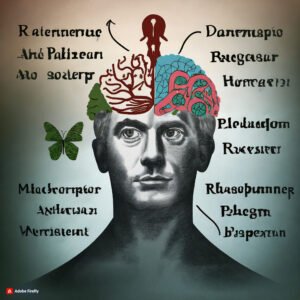Introduction
Bipolar disorder, once known as manic-depressive illness, is a complex mental health condition that affects millions of people around the world. It’s characterized by extreme mood swings, from periods of intense mania or hypomania to episodes of severe depression. In this blog post, we will delve into the different types of bipolar disorder, explore their symptoms, and discuss common triggers.
Types of Bipolar Disorder
1. Bipolar I Disorder: This is the most severe form of bipolar disorder. Individuals with Bipolar I experience manic episodes that last for at least seven days or are severe enough to require immediate hospitalization. Depressive episodes also occur, often lasting for two weeks or more. The cycling between mania and depression is the hallmark of this type.
2. Bipolar II Disorder: Bipolar II is characterized by recurring episodes of depression and hypomania (a less severe form of mania). Hypomanic episodes are often mistaken for high productivity or good moods, but they can still disrupt daily life. Unlike Bipolar I, there are no full-blown manic episodes in Bipolar II.
3. Cyclothymic Disorder: Cyclothymic disorder is a milder form of bipolar disorder characterized by numerous periods of hypomanic and depressive symptoms. However, these symptoms are not severe enough to meet the criteria for a full-blown manic or depressive episode. Cyclothymic disorder can persist for two years or longer in adults and one year or more in children and adolescents.

Common Symptoms
Understanding the symptoms of bipolar disorder is crucial for early diagnosis and effective management. Here are some key symptoms associated with bipolar disorder:
Manic Episodes:
– Elevated or irritable mood
– Increased energy and activity
– Decreased need for sleep
– Racing thoughts and rapid speech
– Impulsive behavior and poor judgment
– Grandiose beliefs or inflated self-esteem
– Engaging in risky behaviors, such as reckless spending or substance abuse
Depressive Episodes:
– Persistent sadness or hopelessness
– Loss of interest in previously enjoyed activities
– Changes in appetite and weight
– Sleep disturbances (insomnia or oversleeping)
– Fatigue and low energy
– Feelings of worthlessness or guilt
– Difficulty concentrating and making decisions
– Thoughts of death or suicide
Common Triggers
Bipolar disorder can be influenced by various triggers, although it’s essential to note that not all individuals with bipolar disorder will respond to these triggers in the same way. Here are some common factors that can contribute to mood swings:
1. Stress: High levels of stress can trigger both manic and depressive episodes. Learning effective stress management techniques can be vital for individuals with bipolar disorder.
2. Sleep Disruptions: Irregular sleep patterns, sleep deprivation, or changes in sleep routines can destabilize mood. Maintaining a consistent sleep schedule is crucial.
3. Substance Abuse: Alcohol and drug use can worsen symptoms and trigger episodes. Substance abuse can also interfere with medication effectiveness.
4. Medication Changes: Abrupt changes in medication, including discontinuation without a doctor’s guidance, can lead to mood swings.
5. Life Transitions: Major life changes, such as job loss, divorce, or the death of a loved one, can exacerbate bipolar symptoms.
6. Seasonal Changes: Some individuals with bipolar disorder may experience seasonal patterns, with mood episodes occurring at specific times of the year.
Conclusion
Bipolar disorder is a complex condition that requires comprehensive treatment and support. Recognizing the different types, understanding the symptoms, and identifying common triggers are critical steps in managing this disorder effectively. If you or someone you know is struggling with bipolar disorder, seeking professional help is essential. With the right treatment, therapy, and support, individuals with bipolar disorder can lead fulfilling lives and manage their condition successfully. Remember, you are not alone, and there is hope for a brighter future. if you are feeling depressed read our article
